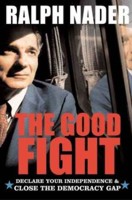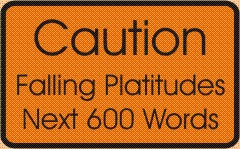"Man will occasionally stumble over the truth, but most of the time he will pick himself up and continue on."
- Winston Churchill
Note: Posts appear in chronological order from top down.
March 15, 2008
I never planned on starting this blog on this particular date, but since both Jung and Freud tell us there are no accidents (although they mean that in quite different ways, and the Geico gecko would doubtless disagree) I'll make the most of the synchronicity. In case you haven't noticed, Caesar is getting way out of hand these days, demanding the rendering of all sorts of things that are most definitely not his. Only a fool would imagine that the solution that occurred to Brutus and Cassius et al would be more effective now than it was then. (For those of you who slept through first period history class in high school, they tried to eliminate despotism by murdering a despot and only succeeded in jump-starting the Roman Empire.)
Something must be done, however, and although voting for some Democratic politicians does suggest itself, I must say that I am less than fervent about that collection of predominantly spineless scum. Better those with no convictions than those with malevolent fervor, I suppose, but how much better? You who are all a-twitter about the prospect of Ms Clinton starring in a revival of Evita should search out some news stories relating to the lobbying and consulting activities of her illustrious husband. Obama? I don't know. I suppose I hope he wins, but he's still a politician.
If these United Skates are to depart the golden path of world domination and to stop behaving like the sequel to Rome (great TV series, by the way), it's going to take more than an election. We the people need to revisit the idea that all people are created equal, not just ourselves and our friends in the developed world. We need to consider the possibility that we bear some resonsibility toward the 14 year old girls making our shoes for 25 cents an hour, and toward all of the other victims of the global economy whom I shouldn't need to catalogue.
I am not a historian, but I have read enough to see that the agreed-upon facts of our nation's past are not only open to alternative interpretations, they cry out for them. History has been called "a lie agreed upon," and that is certainly true in many cases, but I would say that a better formulation would be "a narrative agreed upon." Good fiction, emotionally honest and intelligent fiction, has its own sort of truth. History is in a sense a fiction, a sort of docu-drama that attempts to lend meaning to the collective experience of millions of people over centuries of progress and conflict by imposing a narrative that sums up the complexities of that experience in bold, memorable strokes. The problem is that one person's bold stroke is another's white-wash.
In future posts I will present a wide variety of highly debatable opinions, including some alernative narratives relating to American History. My purpose is not to "tear down" this country, but to point out that we have come a long way against formidable adversaries, and that in some cases those adversaries have been not enemies foreign or domestic, but the demons within ourselves. To decide where we are going it may be helpful to reconsider how we got here.
Episode 2:
Not Another Dream Sequence?!

Photo by Lorette Roome
- Walking with Bill
How to Make a Falafel - Bill Ring
Begin at the seaside (the beach at Coney Island for preference).
A jet-black personal submarine beaches itself, thrashing around like a demented dolphin. On closer inspection it turns out to be a vinyl bondage apparatus which open to reveals a pneumatic brunette with electrodes fastened to her most sensitive parts, including her rather spectacular but clearly natural nipples. You recognize her from the internet, but cannot recall her name. What happens for the next half hour or so is gratuitous and not relevant to the recipe.
Eventually you extract her from her restraints and remove the electrodes. From the gym bag you were given by your controller (yes, Toby this is official!) you provide her with appropriate clothing in which to continue your mission. From a compartment in the u-boat she hands you a letter (a "sub-missive?") which you are sure must contain further instructions, but which appears to be written in some incomprehensible ancient hieroglyphic script.
Determined to pro/suc-ceed despite all setbacks, you stash the S/M costume, the electrodes, and whatever else you won't be needing in the gym bag, cache it in the lee of a large rock under the boardwalk, and dash off in search of a payphone. Your next task is to place an anonymous call faking a kidnapping (of whom? Didn't the controller tell you?), demanding an exorbitant ransom. The nearby phones are dangerous, too close to the landing site, so you decide to get away from the beach first.
On a dark, narrow street flanked oppressively by massive office towers you find a payphone, deposit a dime, try to put in more change, but find the slot mysteriously clogged with fresh chewing gum. The operator's voice informs you that you will have to insert additional money after placing your call, but something she says makes you realize that this is one of those new security phones with a built-in camera. She can see you! Thank god you didn't make the ransom demand! You grab your partner by the hand and allemande left in search of a less paranoid phone booth.
In a neighborhood of mixed residential and commercial character, mostly 3-story brownstones, you see an old-fashioned electric payphone that resembles a juke box, but when you approach you realize that it is inside the brightly lit living room of a small blue one-story clapboard house, and you are seeing it through a picture window. You decide to try the Korean fruit and vegetable stand on the corner, but as you enter it turns into a small art gallery (more pictures!), so you leave again and head off down a predominantly residential side street where you find a falafel vendor's pushcart set up next to a simple sidewalk payphone. This is your chance to complete the mission in one step!
While your companion distracts the vendor you take over the falafel cart and wheel it directly in front of the booth. If you can assemble a falafel sandwich while talking on the phone to the prime minister and making the ransom demand, he will be confounded and lose the election! The process of falafel making involves mixing the ingredients in a large FedEx envelope, then sealing and shaking the envelope so that the falafel, salad, and sauce bubble up like a rising cake and fill the envelope, which is actually a pita. But something goes wrong and you wake up as the mess overflows.
And just whom were you supposed to kidnap?
Email
the perpetrator
Don't worry about the previous post. It's only a short story based on an actual dream. Just keep repeating "There's no place like home," and click your heels and you'll be back in Kansas before you know it... Really.
But I digress. Getting back to the slightly less hallucinatory realm of politics and history, I have been working up to putting together an essay concerning the official version of how we assess the historical significance of slavery in American History. I'm not quite ready to hold forth fully on that subject yet, but I thought I would share a couple of fun facts I don't recall hearing in my high-school history classes.
-
The first American casualty of the war for independence was a black man, Crispus Attucks, who was credited with (or blamed for) instigating the famous "Boston Massacre." The British soldiers who fired on the crowd were defended in court by none other than John Adams, whose description of Attucks' super-human strength and ferocity sounds eerily familiar to anyone who remembers the arguments made to justify police brutality in the Rodney King case. (I had heard Attucks' name before, but the information about how Adams conducted the soldiers' defense was new to me.)

-
The original draft of the Declaration of Independence contained a condemnation of the slave trade {he has waged cruel war against human nature itself, violating it's most sacred rights of life and liberty in the persons of a distant people who never offended him, captivating and carrying them into slavery in another hemispere, or to incure miserable death in their transportation hither. this piratical warfare, the opprobium of infidel powers, is the warfare of the Christian king of Great Britain. [determined to keep open a market where MEN should be bought and sold,] he has prostituted his negative for suppressing every legislative attempt to prohibit or to restrain this execrable commerce [determining to keep open a market where MEN should be bought and sold]: and that this assemblage of horrors might want no fact of distinguished die, he is now exciting those very people to rise in arms among us, and to purchase that liberty of which he had deprived them, by murdering the people upon whom he also obtruded them: thus paying off former crimes committed against the liberties of one people, with crimes which he urges them to commit against the lives of another. }which was removed from the final version by the Continental Congress on July 1, 1776. Only a brief reference to the incitement of domestic insurections was included. Since Thomas Jefferson himself owned slaves, as did George Washington and many others in that Congress, this editing change probably met with minimal opposition.
For more on this subect, click here.
As I said at the start of this post, I am not ready to go into this subject fully right now, but as a sort of teaser I can say that I intend to pursue the thesis that both slavery and genocide against the native people of North America were not, as the conventional view would have it, unfortunate side-lights to the more significant story of a nation "conceived in liberty and dedicated to the proposition that all men are created equal," but rather that slavery and genocide were central necessities in the creation of this nation, and that without those crimes against humanity the United States of America could not and would not exist in its present form.
The history of every nation is full of ugly truths, and I don't mean to suggest that those of us living today must put on sack cloth and ashes in eternal repentance for the sins of our fathers. What I would like to see is a bit less pompous, self-righteous posturing - a tad less smug, arrogant assurance that this nation can or should tell the rest of the world how to live. We too often behave like fanatical former chain smokers who lack all appreciation of the reality that other people's circumstances differ from ours. A little humility on our part might go a long way toward reducing the hatred and resentment we inspire around the world.


Those who have a fairly clear understanding of how science works seem to believe that we humans now know a lot about every possible subject, and that all that remains to be done is to fill in the details. There may be a lot of details, and a great deal of work to be done to fill them in, but the core of this view is that nothing important has been omitted from scrutiny. The opposing view, which I encounter among those who have only a vague and usually inaccurate idea of how science goes about studying things, is that the scientists are simply wrong about many of their strongly held opinions about how the universe operates, and that they concoct experiments in dishonest ways in order to shore up their false theories. This latter group seems unaware of the unceasing efforts of individual scientists to make each other look bad by debunking each other's work - otherwise referred to as "peer review."
I believe that both of these views miss the point. For all its shortcomings, the scientific method has proven fairly adept at weeding out invalid theories, so that it is fair to say that most of the established ideas of how things work are probably true, in so far as they go. The glaring shortcoming of science lies not in the finding of incorrect answers, but in the failure to ask certain pertinent questions, or even to admit that these questions exist. For example, if information cannot move faster than the speed of light, then what is the mechanism behind Bell's Theorem? (Vastly oversimplified, this theorem of Quantum Mechanics states that all particles in the universe behave as if they are in instantaneous communication.) Even more astounding to me is the absence of any serious attempt to explain the difference between a living creature and the dead body of that same creature.
Now that "dark energy" has joined "dark matter" in the realm of "things we don't know shit about," it is time for science to admit how little we know. If most of the matter and energy in the universe is unknown and unobserved by us except through indirect evidence, and if electrons can "communicate" instantaneously across interstellar distances, then we need to reconsider concepts like "life energy" and telepathy. As Shakespeare put it, "There are more things in heaven and earth, Horatio, than are dreamt of in your philosophy."
If you are now expecting me to reveal the ultimate truths on these subjects, you must think that I am either a lot smarter or a lot crazier than I actually am. My only point is that if you are dissatisfied with consensus reality, stop complaining about the way science looks for answers and try coming up with some better questions.
PS: With regard to the previous post, when I wrote that I had
not yet heard Obama's speech on race. Now that I have, I must
congratulate him on walking that particular political tightrope
without sounding like a mealy-mouthed weasel. The essay I propose
to write will have a different emphasis, but I hope it will aid
his purpose by providing a clearer view of how we arrived here
in order that we may better decide how to proceed.
Episode 5: Politics and Other Bad Jokes
A recently imprisoned suspected dissident was unexpectedly released today after Chinese authorities discovered that his demand for "elections" had been misunderstood. It turns out he was simply requesting a prescription for Viagra.
Sadaam Hussein isn't really dead. The guy they executed was a double. Now that things are deteriorating in Iraq, some powerful people are considering bringing him back to assert control. A delegation approaches him in his secret lair and asks if he would be willing to reassume his former office. He replies, "OK, but this time, no more Mr. Nice Guy."
The furor over Bill and
Hillary Clinton's financial exploitation of their status as
former first couple seems to be dying down after the revelation
that most of their $109 million income over the past eight years
was unrelated to political lobbying. Apparently they have been
platooning at second base for the Kansas City Royals under assumed
names. "We're not ashamed of playing ball," Ms Clinton
said with a wry smile, "although I wish our record had
been better last year."
Political analysts believe that the
couple's use of aliases was due to the NY senator's concern
that Yankee fans might have objected to her playing for an American
League rival. "We did try out for the Yanks," Clinton
explained, "but they didn't have roster space for both
of us, and we wanted to be together."
QUIZ: Who said: "We can all be a little late sometimes in doing the right thing."
A) Hillary Clinton while announcing her intention to divorce Bill
for adultery. "Pot isn't the only thing he never sucks on,"
she quipped.
B) Barack Obama during a speech in which he admitted to having "a
small percentage of Negro blood."
C) John McCain reversing his 25-year old opposition to a holiday honoring
Dr. King.
D) The author of this blog while finally putting an end to this particular
post..
And now for something completely different:
The meaning of human life lies in our ability to appreciate of the beauty and mystery of the universe. We are sentient for a purpose. Through us the universe has the means to contemplate its own form. The existence of what we call evil is not a paradox. Evil and death are absolutely necessary both because nothing can exist without its opposite, and because they add a sense of gravity to human experience. (Actually, that is really just two ways of saying the same thing.) Consider how beautiful tragedy can be, how great is our appreciation of a heroic struggle against suffering. Our individual consciousness is part of the "mind" or "soul" of the universe, and our individual sorrows are an indispensable part of the story that the universe tells itself by existing. We become dissatisfied and unhappy when we feel that we are missing something, that there is something else we should be doing to fulfill the purpose of our existence, and that our lives will be wasted if we do not find that purpose. But all we need do is to look and listen around us at any moment to perceive the beauty and mystery of even the most mundane creature or object. This perception is our purpose. Once we realize that, everything else becomes bearable.
But what of the feeling that the world is lacking in magic and wonder? The whole idea of yearning for magic is based on a fallacy. When viewed with a fresh eye, everything is magical. Just because science "explains" something doesn't make it any less magical. If the spells and potions of fairy tales existed, we would study them and learn to understand them, and that would be "science" instead of magic. The flight of a bird, the ability of a squirrel to chew off just the right part of an acorn so it won't sprout before he digs it up again, the bizarre and beautiful patterns created by a simple fractal equation, the formation of crystals... science describes how these things behave, but their very existence, the very fact that anything exists at all, is as fantastic as any Arabian Nights tale. Science is magic: the study of fabulous phenomena in order to be able to control and predict them. Only a failure of imagination leads us to regard reality as "mundane" and seek the magical. Open your eyes; magic surrounds you.
Of course it is easy to speak of beauty and magic when one is healthy, comfortable and well-fed. The true test of philosophy is found in situations of extreme duress. I have always felt that no philosophy is valid unless one could unashamedly present it to the inmates of a concentration camp. I believe that this is true of the above, because even in that man-made hell you could find examples of courage and nobility of spirit among the inmates. By appreciating their ability to remain human in the face of inhumanity, you could still fulfill your purpose. The monstrous evil of the persons who create the camps provides a context for heroism that could not exist without that evil.
Please understand that there is nothing in this argument to suggest that one should perpetrate evil in order to create such a context. I only mean to say that for the universe to contain good, the possibility of evil must exist, and that if the possibility truly exists, then surely it will manifest itself. It is not required of us that we abet or feign the madness of evil men, only that we appreciate the beauty of the struggle against them.
Postscript: So much for my insufferable philosophical
ramblings, at least for the present. I'll try to be more sarcastic
in the next few posts, although you must know how difficult I find
that. .
Episode 7: How Much is that Doggerel in the Window?
We all have our secret vices. Writing limmericks is
one of mine.
A drunken old monk who would roister
And carouse on the roof of his cloister
Slipped and fell with a "Squish!"
In a satellite dish,
Whereupon he resembled an oyster.
A dyslexic agnostic named Fogg
Couldn't rest 'til he'd finished his blog.
Though his brain felt quite bruised,
"Til the morning he mused,
Wond'ring whether or not there's a dog.
A hotelier alone with a guest
Placed a wandering hand on her breast.
When she sighed as he squeezed
He pronounced himself pleased
And proceeded to sample the rest.
A macho bicyclist named Dowd
Voiced comtempt for the black leather crowd.
"To be motor-assisted
Surely shows you're limp-wristed.
Muscle power's for men!" he avowed.
Tete to tete with a comely young pupil,
A professor much lacking in scruple
Would examine her well
Past the final class bell.
To such depths vulgar mountebanks stoop'll..
PS: The answer to the "quiz" in episode 5 is C). That's
a real quote from McCain's remarks on the anniversary of King's assassination.
Episode 8: The Affairs of Men, Part 1

"There comes a tide in the affairs of men, my dear Blubber, when we must take the bull by the tail and face the situation." - W.C. Fields
I hardly know where to begin. The shear volume of BS to which we are subjected on a daily basis is daunting. Joan Rivers all but based her career on saying "Grow up!" as she stuck her pin in the balloons of self-deception. Lenny Bruce was hounded to his grave for insisting on talking about "what is" in preference to "what should be". "Give me a break!" "Get real!" "That'll happen." - Our speech abounds, as well it might, in idioms and catch phrases expressive of sarcasm, skepticism, and outright scorn. It's rather like the Eskimos having 27 different words for snow. (OK, I know I should say "Inuit", but I'm not sure everyone is familiar with that term. My apologies to the many seal hunters who are regular readers of this blog.) When your environment is dominated by a single substance you tend to develop an extensive related vocabulary.
To avoid being overwhelmed by the rich choice
of possible subject matter I will refrain from dwelling on such well-known
instances of BS as the spurious justifications offered for the colonization
of Iraq, the manifold absurdities of commercial advertising, and so-on.
Where possible I will try to point out a few less obvious examples
that may have escaped your attention. Here's one of my perennial favorites.
Beauty and the Beast


Possibly the most familiar of all fairy tales, particularly since it is endlessly retold and alluded to in films featuring aging male actors and rising young ingénues. But what, precisely, is the moral of this fable? In its original form it supposedly teaches us to look beneath outward appearance to see the inner worth of a person's character. The Beast has a beautiful soul, and when Beauty comes to realize this he is transformed (at least in her eyes) into a handsome prince, and they live happily ever after.
So OK. I won't bother about that "happily ever after" bit. We all know that nothing lasts forever, and that the happy ending is a convention as old as fiction itself. That's not so much BS as it is a lie agreed upon for aesthetic purposes, and I like a good happy ending as much as anyone. My problem lies with the notion that the Beast is such an exemplary character that a clear sight of his soul is enough to set Beauty a-swooning.
As our story opens, Beauty is a fairly normal young woman whose one apparent endearing quality (other than her appearance) is that she agrees to take her father's place as the Beast's prisoner. Depending on the version of the tale, she either volunteers for this duty or does it out of obedience to daddy's demand. In either case the Beast takes one look at her and falls in love, and the rest of the action is essentially a prolonged courtship, during which the gal gradually discovers what a great guy he really is.
So what's wrong with this picture? Simply that while Beauty is discovering the Beast's sensitive, artistic soul, he's dressing her up in fancy gowns and peeking down her décolletage. Let's face it, no one ever heard of "The Beast and the Overweight Milkmaid With a Serious Case of Acne". I mean, come on, her name is "Beauty" for crying out loud. If the lesson here is supposed to be about seeing the inner person, then what kind of example is our protagonist setting by falling for the first good-looking babe he lays eyes on? Does she play the violin, read philosophy, volunteer at the local hospital? Who cares. She's hot. That's good enough for him.
Then again there is the rarely mentioned fact that the Beast is a blackmailing kidnapper who got her attention in the first place by threatening to kill her father, and that the entire affair could be seen as an early example of the "Stockholm syndrome." This is our "beautiful soul"?
The real message of this tale, remembering the historical context from which it arises, is that a young woman should make the best of marriage with whomever her father choses to peddle her to, and not complain about hubby's unpromising physical appearance. After all, the highest bidder for a pretty young bride is unlikely to be a handsome young man, and father knows best. In today's context this tale is recast as a justification for the "trophy wife" syndrome. (Funny how young women who spend several hours a day doing aerobics have souls that are so much more beautiful than those of middle-aged women who once upon a time gave up their own education to put an ambitious husband through law school.)
Female readers are probably nodding their heads about now (or perhaps saying, "Duh, no shit Sherlock.") but perhaps the male reader may find something to think about. Maybe I'm making too much of this, but I watch a lot of movies, and I am struck by the amazing number of times that a really old male movie star is romantically paired with a gorgeous young actress with no hint that anyone thinks something peculiar is going on. (Check out Diane Venora and Robert de Niro in Heat or Halle Berry and Warren Beatty in Bulworth for two of the more ludicrous examples that come to mind.) I'm not about to go all sociological on you now and try to analyze the effect of all of this Hollywood May-December stuff on the American psyche. I just calls 'em as I sees 'em.
That's all for now, buckaroos. Time to piss
on the campfire and head for the bunkhouse. Happy trails, and watch
where you step.
Episode 9: I'd Rather Be Neither Right Nor President

Sometimes the truth makes you free, but more often than not it just hurts. Those with a low threshold of pain might be well advised to skip this post. What follows is a haphazard compendium of things that I don't usually say because even though I am convinced they are true, I am not sure that saying them is wise. However, let it never be said that I let prudence stand in the way of a good opinion. Don't say you haven't been warned.
Justice, Schmustice .... Show Me the Money

If it could be proved that the "weapons of mass destruction" justification for the invasion of Iraq was actually valid after all, but gas cost $5.00 a gallon, the soccer moms would still be howling for Bush's blood and trying to decide between Clinton redux and Obama yo' mama. If, on the other hand, a memo surfaced which implicated the entire Bush cabinet in a massive conspiracy to fabricate intelligence and defraud the American people, but gas cost $1.50 a gallon, the Republicans wouldn't even have to campaign to retake both houses of Congress and the Presidency. As long as there is no draft and the military is composed largely of hapless volunteers drawn from the permanent underclass, it will be the economy, not the morality of US foreign policy that dominates our politics.
It's Not Easy Being Green

The simplest model of technological civilization is a huge pipe into which irreplaceable resources, clean air, clean water, animal species, rain forests, etc. are sucked at one end while a Stygian torrent of sewage pours out the other. Recycling is essentially a little guy with a bucket scooping up a tiny amount of noxious outflow, lugging it around to the intake, and tossing it in. I'm willing to go along with the gag, but anyone who actually believes that putting rocks in your toilet tank and separating your garbage into seven different categories is saving the planet is kidding him/herself. Maybe nanotech and biotech will rescue our butts, but I suspect that the problems caused by these new technologies may prove even more disastrous than those we know now.
I'm Deeply Shocked To Find Gamboling Going On Here
One of the main reasons I try to maintain a neutral, if jaded, perspective on party politics is that I hate feeling happy when something dreadful happens. Every time I hear about some bloody disaster in Iraq or Afghanistan, I feel a twinge of glee at the discomfort I know it will bring to the administration. I even find myself wishing for the reinstatement of the draft because I am sure that a massive resurgence of anti-government sentiment would result. In politics bad things that will be blamed on the opposition are prized above peace and prosperity. Does anyone really believe that the right-wing scum behind the "patriot" act were sorry that the World Trade Center went down? This dilemma is not peculiar to any particular political philosophy, by the way. "What's bad for my enemy is good for me," is the general rule, even when it's also bad for a lot of innocent bystanders.
Enough Already

At first I thought this post might go on longer, but I'm beginning to depress myself. Hopefully the next one will be funnier. Thanks for your patience.
Episode 9.1: Just When You Thought It Was Safe...
Hot off the presses: I just saw a story concerning Carter's much-disparaged meeting with Hamas. I'm not going to go into the details, because you can find that elsewhere. What strikes me is the reasoning behind people's objections to his talking to them in the first place. Basically, the argument is that Hamas is a terrorist organization, therefore no one should meet with them until they renounce terrorism. (True, the US and Israeli governments probably also object to a private citizen poaching on their turf, but I doubt that argument has much to do with most people's concerns.)
The trouble with this reasoning is that Hamas
is a large organization with a lot of supporters, and calling them
names and demanding they stop being "terrorists" when they
see themselves as "freedom fighters" isn't likely to have
much effect. We watch too much television and see too many right-wing
"action" movies. We want to personify "evil" in
one villain and have Jack Bauer kick his ass and bring peace. Whether
we admit it or not, a lot of us in the secular humanist West would
like to be able to push a button and blow away everyone who makes
us nervous, including most if not all of the Islamic world. We need
to grow up and realize that there is no improvement possible in this
whole "terrorism" business until we stop bullying and start
talking.
Episode 10: I was like no way and he was like way.

Even in the absence of punctuation, we understand the meaning of this sentence. One way to paraphrase it would be: "I denied the validity of his statement, but he vigorously reaffirmed it."
But is the second statement really equivalent to the first? In fact, no additional information is conveyed by the "improved" version. It is neither clearer nor more precise; actually it is a bit pompous and wordy. Yet most of us would regard the speaker in the first instance as an "air-headed kid," while the second suggests a person both intelligent and well educated. We assume that the first speaker knows no other way of expressing this thought, and is therefore intellectually inferior to the second.
Lenny Bruce said that if Einstein had spoken with a southern drawl as did (then president) Lyndon Johnson, no one would have taken the theory of relativity seriously. The catalog of doubtful assumptions we make based on the manner rather than the meaning of a person's discourse would probably fill a very thick scholarly volume, if not a shelf full of them. Needless to say, I'm not about to write that volume, but I just thought I'd present the subject for your consideration.
It occurs to me that I see this as a special case of the form vs function dichotomy. Style vs substance, charisma vs character... "It's the singer, not the song," says Mick Jagger. Particularly disturbing is our tendency to overlook evil behavior when the villain happens to be able to project a pleasant personality. Even Idi Amin and Adolph Hitler have been described as "charismatic" in face-to-face situations. The charming rogue is probably the quintessential American folk hero. I can't begin to count the number of movies and TV shows I've seen in which a petty criminal is presented as a good guy because he is handsome and glib.
The converse is also true, of course. We tend to underrate virtue if the person displaying it is boring in conversation or unattractive. I wonder how much better the Green Party would fare if Ralph Nader had a better tailor and a speech coach, or how much higher people would rate Jimmy Carter as a president if he sounded like he graduated from Yale instead of Georgia Tech. Personally I have more than once been unsettled to find myself admired for a stylish character flaw or despised for doing something I thought honorable.
Even though I took a shot at Beauty and
the Beast in an earlier post, the idea of trying to look beyond
the superficial is a good one. You may be "No way!" about
that, but I am definitely "Way!"
Episode 11: When It's Oeuvre, It's Oeuvre. (Confessions of a Hasn't Been)

Long after I started playing music in clubs,
I discovered that I am actually "the other Bill Ring." In
(I believe) the 1930's and 1940's there was a Bill Ring Show
on country music radio. Click the button above to hear that show's
theme song.
I am definitely not related to this guy, which makes it particularly odd that his novelty country songs sound uncomfortably close to a lot of the material I used to do with Ironwood. (Insert Twilight Zone theme music here.)
Although I wouldn't say my namesake exactly
"ate my lunch," he definitely did get to the buffet first,
even appearing on the Grand Ole Opry. Recordings of some his
shows are available on the Grand Ole Internet, along with a few pictures,
and even a video of an Opry appearance.
Episode 12: Something For Everyone
The hippest satirist of the late 1950's to early 1960's, Mort Sahl, used to end his monologues by saying, "If there is someone I haven't offended, I apologize." I mention this because what I intend to say here would be extremely offensive to a lot of people if they should happen to read it. Of course I don't really need to worry about that since I have so few readers, so here goes.
One topic that I have been alluding to, but not really facing head-on, is the meaning of the word "terrorism." When the US bombed Libya, killing and wounding many civilians, including the children of the guy in power, no one on our side of the fence called that "terrorism." Ditto for Israeli rocket attacks on defenseless villages. Terrorism is what the "bad guys" do; and of course we are the "good guys." Right? Another apparent criterion is that it isn't terrorism if a guy in a uniform drops a bomb from the sky or fires a missile from a safe distance at no risk to himself, but it is terrorism when someone is willing to die to prove a point.
My personal revised standard dictionary defines terrorism as deliberately killing civilians and openly torturing prisoners in order to demoralize an enemy. By this definition the most notorious instances of terrorism (such as 9/11, whoever actually pulled that one off), would still be called "terrorism," but so would a lot of officially state-sanctioned actions such as those I mentioned above. If you want to see what a rogue nation that engages in state-sponsored terrorism looks like, and you happen to be an American, you're in luck. Just look around you. Even the current administration is aware that they may have gone too far lately. Bush's outrageous attempt to write himself and his accomplices a "get out of jail free" card for war crimes shows just how morally bankrupt our government has become.
As far as "terrorism" in Iraq goes, I would say that car bombs in market squares are acts of terrorism, but attacks against US military personnel are not. When a foreign army invades your home and tries to justify that invasion with lies, fighting against that invader is called patriotism, not terrorism. I am quite sure that during World War II the German army referred to the French Resistance as "terrorists." No one was fooled then, and no one should be fooled now.
How's that for offensive?
For those who are still with me, a few aphorisms for your amusement. Consider this my attempt to emulate Ben Franklin's Poor Richard's Almanac.
Today is the tomorrow you worried about yesterday... and boy, did you have that right!
I think too much, therefore I am too much.
A conservative believes that talking about a problem is as bad as having caused it, while a liberal thinks that talking about a problem is as good as having solved it.
Anyplace I hang my head is home.
The only thing more absurd than imagining that the universe came about by blind accident is believing that it was created by a vindictive old man whose major preoccupation is what you do with your genitals.
Experience is the great teacher; unfortunately what it teaches most often is: "Don't do that!"
Nothing exceeds like excess.
There are two kinds of people: those who divide people into categories and those who don't.
Sex is the only arena of human endeavor in which the efforts of amateurs are prized above those of professionals.
I have too much respect for the truth to bandy it about indiscriminately.
Footnote to Episode
12:
Just to clarify something,
I don't want any US soldiers or civilians in Iraq to be killed or
wounded. I just want them to come home now. I expect most of
them want the same.
Episode
13:The Ape That Played
Golf on the Moon


For hundreds of millions of years the earth (and/or whatever agency may be said to be in charge thereof) was content to bring forth myriad plant and animal species whose only visible concerns were survival and propagation of the species. In spite of mass extinctions, life always came back in new forms, but always apparently limited to those two driving imperatives.
Then about an eye-blink ago in the evolutionary timescale something remarkable happened. In fact, the very possibility that anything could be remarkable happened. Several different species of upright primates began to invest an unprecedented amount of bio-energy in an organ that many very successful species have managed almost without: the brain. It took most of that eye-blink to determine the winner of the brain game, but now here we are: the dominant life form on earth, in a way that the term "top predator" hardly begins to properly describe.
As a typically arrogant member of our most arrogant species I think I may have a handle on why this amazing development took place (see Episode 6: Why are we here?), but I am desperately trying to get my mind around the question of what might come next. Most of us assume that from here on out extinction is a possibility for other species, but surely not for us! Since by definition no human has ever experienced a world without humans (duh!), we find it very difficult to conceive of such a future. But how realistic is this view?
The horseshoe crab has been around, virtually unchanged, since before the dinosaurs. Most other species have come and gone in considerably less time. Unfortunately for anyone who tries to predict the future, none of our knowledge of the history of evolution really provides a valid precedent for our own case. For one thing, no other species has ever been aware that there is such a thing as evolution. (Say what you want about dolphins; they can't dig up fossils in the mountains of Mongolia.) Nor has any other species ever possessed the ability to influence its own fate to the degree that we can. Of course the question of how we will use this ability is wide open.
Throughout most of my life the nuclear sword seemed to hang over our heads. Even before the "nuclear winter" problem was discovered, speculative fiction was dominated by doomsday scenarios. Now, since the breakup up the Soviet Union, the specter of an all-out nuclear war seems vanished. The threat of a terrorist attack employing a single "suitcase" bomb is horrifying, but that is a far cry from the "end of civilization as we know it" that I grew up expecting at any minute. The fact that the end of that threat was greeted by a world-wide "So what?" rather than parades and dancing in the streets is perhaps a topic for a future episode, but for now I will stick to the question: "What next?"
During the Cold War we came close to destroying ourselves by letting old habits of short-sighted, pig-headed hostility unleash brute technology. Did we come to our senses, or did we just get lucky? What worries me is the impression that, driven by economic necessity, the Soviet Union figured out something that the USA has yet to grasp: that in an increasingly interdependent world it is impossible to do significant damage to any large group of people without irreparably harming yourself.
New technologies mean new forms of power, and new ways in which that power can be set loose to destroy. Nuclear annihilation could only be accomplished by an entity large and powerful enough to be unable to do so without shooting itself in the foot. (If you think you own the world, you don't want to blow it up.) Self-replicating weapons based on bio-tech and nano-tech may change that. If it becomes possible to start a plague of destruction by tossing a handful of dust-sized tailored organisms or nano-machines into the air, the power to end civilization could be placed in the hands of an otherwise powerless individual who wouldn't be sorry to see it go.
Returning to the "long view" of the evolutionary time scale, I wonder if the end of civilization as we know it is something that must happen for the human race to evolve. Even if we do our worst, it is difficult to see how we could destroy ourselves completely. Surely a few people would find a way to survive and, in time, repopulate the earth. Perhaps several million years from now our descendents, very different from us in ways we can't imagine, will see history not as the story of kings and presidents and wars, but as a cycle of stages of civilization of which all of what we now call "human history" is only the first.
Stay tuned.

Years ago I saw a cartoon of a little boy standing in front of his parents, being scolded for his bad behavior. "What do you think the problem is," the kid asks, "heredity or home environment?"
We are torn between the impulse to blame people for their misdeeds and the desire to explain behavior in terms of influences. (If you don't like the word "blame," how does "hold accountable" grab you?) Criminal defendants plead "temporary insanity" and we either wax indignant about someone "getting away with it" or complain about the restrictive and unscientific legal definition of insanity when the defense fails in some case we find sympathetic. An extremely high percentage of child abusers were themselves abused as children. Are they perpetrators, or victims compulsively re-enacting their own abuse? Both?
Supposedly the basic principle is that people who "can't help it" shouldn't be punished for their misdeeds. But in practice we don't really act as if we believe that. Didn't we used to call Sadaam Hussein a "madman?" I don't recall hearing anyone saying he shouldn't have been executed because he was insane. Would Hitler have been allowed to finish his life in an asylum if he had been caught alive and tried after WWII? What about serial killers? Does anyone really believe that Jeffrey Dahmer was sane? If the crime is heinous enough, we just want to punish the perpetrator, crazy or not. It is macabrely humorous to see a prosecutor arguing throughout a trial that a man who kidnaps people to rape, torture, and eat them is sane. Then, should the jury find the defendant not guilty by reason of insanity, that same prosecutor will spend the rest of the man's life arguing that he is still insane to prevent his being released as "cured."
With the advance of pseudo-science, the issue becomes even more blurred. Seemingly every week some psychiatrist in "publish or perish" mode invents a new "disease" by giving a fancy name to a type of behavior that was formerly referred to as "being an asshole." People who drink too much or bankrupt themselves by gambling now excuse themselves by saying that they have an illness. A fourteen year old kid raised by abusive foster parents panics and shoots a store clerk in a botched robbery, and he is declared to be a competent, rational adult eligible for a death sentence, while a multi-millionaire movie star who violates his parole for the 78th time is "sick" and "needs help." (Of course this is nothing new. "Kleptomania" has been around for a long time. As a writer for the National Lampoon pointed out, this is a disease only diagnosed in the rich; there has never been a poor, black kleptomaniac. The appropriate term is "thief.")
In the unlikely event that you would like to approach this topic rationally, I offer these two logically consistent positions:
A) Everyone is to be held accountable for his or her own actions. You're sick? Tough. Take an aspirin and proceed directly to jail; do not collect $200. You can seek therapy in prison, but you still do the time.
B) Everyone is a product of influences they neither choose nor have the power to control. Crime of any kind is a manifestation of a personality disorder that needs to be treated, not punished. There should be no such thing as a prison, and everyone who misbehaves should get therapy.
What we do in practice is to bounce back and forth between these poles with no logical consistency, pretending to adhere to principle while really seeking to justify our irrational sympathies. I don't expect this will change any time soon, but we might do better to admit what is really going on.
After all, arguably, we can't help ourselves.
Episode
15: Everything is Relative
Part 1:
There's this third world country that had a general election for prime minister, but the guy who got the most votes didn't win! They have this weird system of apportioning votes by district or something, so the guy who gets the most districts is declared the winner even if more people vote for the other guy. Then, to make matters worse, in the decisive district they screwed up the vote count, and because the district governor was the "winning" candidate's brother they didn't do a recount! And as if that wasn't bad enough, their high court, which is dominated by the "winning" guy's political party, stalled around about ruling on the whole mess, then finally said, "Sorry, now it's too late."
We really need to get the UN in to monitor the elections in this country so this doesn't happen again … What? It wasn't a prime minister; it was a president? Yeah, well, even so … What? It wasn't a third world country; it was the USA?
Oh, then never mind.
Part 2:
There's this nutty religious cult that practices symbolic ritual cannibalism, and they follow this all-powerful leader who they think is perfect and anything he says is the word of God and can't be questioned. Now it turns out that some of their practitioners have been sexually abusing children, in some cases over a period of decades, and the cult leaders have protected the molesters and moved them around to different cities so they could keep doing the same thing to other kids!
We have to wipe this menace out, outlaw them, set fire to their compounds … What? It's the Catholic Church? And they said they were sorry?
Oh, then never mind.
Episode 16: Libatives and Conserverals

If I could make one rule to help begin fixing
every problem in the world it would be this: Thou shalt define
thy terms. Under my limited benevolent dictatorship no one would
be allowed to talk about anything without clearly defining the words
they use. This wouldn't make everyone agree, of course, but it would
at least permit us to understand what the heck we are arguing about.
When "terrorists" meet "imperialist war-mongers"
and "freedom fighters" meet the "forces of democracy"
it is unlikely that any useful dialog will ensue. "Sustainable
growth" sounds like a good idea, but what is it? "Government
interference" sounds like a bad thing, but somehow it never seems
to include spying on people in their bedrooms and doctor's offices.
As usual, I am taking a very small bite out of a very large apple here, so let me focus on one particular pair of abused and misused words: "liberal" and "conservative." In earlier posts I have offered a couple of (hopefully) humorous descriptions of the difference between the two, but those aphorisms refer to the current, somewhat corrupted definitions now attached to these terms. Let's get back to basics and look at what these words were originally supposed to mean.
Liberal:
1) In On Liberty, John Stuart Mill offered the concept of "self-regarding" vs "other-regarding" behavior as a criterion for deciding what laws government should be allowed to enact. Being a creature of his day, he could hardly have expected this principle to be extended to things like gay marriage, although from our present perspective that application seems logical enough. The basic idea is that government may not forbid any sort of private behavior that does not violate the rights of others. It's easy enough to see how there could be a lot of disagreement on what "the rights of others" actually are, but as a starting point for debate it sounds pretty good.
2) The other big Kahuna of liberalism was Adam Smith, who invented the "invisible hand" of the marketplace. His idea is that the forces of competition will separate good products from bad, balance business's need to make a profit against workers' need to meet the cost of living, and otherwise regulate economic matters to such a degree that the best thing government can do is to butt out. Other than passing laws against fraud and other outright criminality, the government has no place in the marketplace. The difficulty with this theory is that competition eventually produces winners, who become rich and powerful enough to crush new ideas, stifle competition, and force workers to accept poverty-level wages and unsafe working conditions.
3) The third component of classic liberalism is the "marketplace of ideas." The true liberal is supposed to listen to all sides in any dispute, and to be prepared to challenge and alter his/her own thinking in light of new evidence or arguments. We all want everyone else to behave this way when we are doing the talking, but we find it extremely difficult to live up to this principle ourselves, particularly when former friends and allies turn against us and call us wishy-washy and indecisive any time we change our opinion about anything.
Conservative:
Interestingly enough, there doesn't appear to be any particular person, or even a historical period, to which one can point as the beginning of conservative theory. (Maybe we should the credit the anonymous Australopithecus who first grunted an objection to a younger member of the clan banging two rocks together.) Many writers have been labeled "conservative," but each was writing against some particular type of change peculiar to his or her time. The general principles of pure conservative thought appear to be: "What we have now is good (enough), let's not mess it up," "New ideas are dangerous," and "Don't make waves." Obviously I'm having fun here, but in all seriousness, the natural human tendency to be wary of change isn't always a bad thing. Maybe new ideas should have to prove themselves before being accepted. As I am fond of saying, they laughed at Columbus, but they also laughed at a lot of damned fools who thoroughly deserved it.
Therefore, what?
The first thing that should strike you about the above is that pretty much everyone in the political spectrum of the US is a little less than one-third liberal except for the Libertarians, who are a full two-thirds liberal, and therefore roundly despised by everyone else. The most staunchly "conservative" politicians are ardently type 2 liberal economists, although probably even they wouldn't go as far in the direction of government non-interference in the marketplace as Adam Smith recommended. On the social side of things, these so-called conservatives at their most extreme want radical change(!) in the direction of government control and surveillance of all private behavior - a position neither liberal nor conservative, but simply totalitarian. Political "liberals" (type 1 only) usually want government to stay out of people's private affairs (except when it comes to things like home schooling and seat belt laws), but in general they never met a regulation they didn't like when it comes to the economy. Libertarians, liberal in every sense except open-mindedness, seem to delight in tweaking everyone else's noses by advocating total free-market economics, legalization of all drugs, and a laundry list of other amusing ideas that should become generally acceptable just about the time that the sun burns out. The type 3 open-minded liberal remains on the endangered species watch list, but a few unconfirmed sightings have been reported.
Notice that in their uncorrupted form the terms "liberal" and "conservative" are not opposites at all. Where liberal principles have become generally accepted, a true conservative embraces them, because to do otherwise would be to advocate change. An intellectual (type 3) liberal is not necessarily opposed to any particular idea, even a "conservative" one, but approaches any argument with an open mind. Conservation, for example, should be an idea embraced by liberal and conservative alike, since it combines a sensible argument for restricting destructive "other-regarding" behavior with a desire to preserve and protect against undesirable change.
In case you haven't guessed, I am a type
1 liberal who tries also to be a type 3, as difficult as that might
be. One way to assist my type 3-ness would be for someone to email
me and tell me why I'm wrong about something in one of these posts.
I can't promise to change my mind, but I'll try to be open to the
possibility.
Episode 17: The Affairs of Men, Part 2


Ok, I give up. I said I would try to avoid obvious targets like politics in my anti-BS screeds, but I was misled by my advisers, several of whom have voluntarily resigned. I was also misquoted by the liberal press, many of whom I suspect of secretly engaging in terrorist hand gestures with "Osama's Baby Momma," ... No, hold on! I never said that, and if I did I didn't mean it, and I'll never do it again, and I intend to give back the money .... where's my flag?
Today's topic: Things you can't say and be elected.
Is there anyone with an IQ over 80 who didn't understand what Obama's wife meant about finally being proud of this country? If I were African American I'd be a whole lot more pissed off about our woeful history of racism than anyone running for office is permitted to acknowledge openly. Hell, I'm white and it pisses me off! The real truth is that a large percentage of the American electorate are knuckle-dragging morons who are so clueless that A) they are actually surprised that Black people think they have something to complain about; and B) they can be fooled into believing that the Obamas are really personally offended by Rev. Wright's minor hyperboles. Any person of color who speaks openly about what being non-white in this society really means couldn't be elected dog-catcher in most of the good old USA.
"The Iraq war was founded on a deliberate lie; the US and it's puppy-dog coalition are propping up an untenable Vichy-style puppet government that will be violently overthrown about a millisecond after we finally give up and get out; and for all his unquestionably evil nuttiness, Saddam Hussein killed a lot fewer people than will the inevitable descent into chaos that the current regime in Washington has blundered into." So long as no one can say these things and remain viable in mainstream politics, there is absolutely no chance for this country to straighten itself out. We are doomed to keep "supporting our troops" by writing a blank check to the liars and thieves who put them in harm's way and, for many of those troops, turned what was promised to be a short term of service into virtual slavery.
Other realities that the successful candidate must refuse to acknowledge include: rescuing the earth from environmental degradation cannot be accomplished without a painful reduction in the standard of living for the entire "first world", especially the obscenely profligate USA; the "war on drugs" is a fraud and a failure; rich people pay way too little in taxes; etc.
Speaking truth to power
In tales of olden times it frequently happens
that some brave soul risks everything to tell the king (or sultan,
or whatever) an unpalatable truth that everyone else is afraid to
mention. Right now in the US it is the electorate that desperately
needs to hear some unpleasant truths. I have no idea where our hero
is coming from, but he or she had better get a move on. We don't have
a lot of time left.

The other never-ending war, the "War On Drugs":
Recent news stories report an alarming increase in opium and coca (cocaine) production, mostly in Afghanistan and Colombia in areas under rebel control. Big surprise? Hardly.
In those rebel-controlled areas, farmers are encouraged to grow coca and opium poppies, both by the rebels and by economic necessities. Since these crops are far more lucrative than anything else they can grow, those farmers are often better off economically than their counterparts in government controlled areas where American-supported governments use their US-funded armies to burn drug crops (along with anything else that happens to be too close) and leave the peasants to starve. US aid winds up in the pockets of US weapons manufacturers and security contractors, corrupt government officials, and soldiers, with virtually nothing going to the farmers who are asked to sacrifice economically to fight the drug war.
Is it really any wonder that "narco-terrorists" and Taliban insurgents are so well supported by the people in their areas of control? We in the US, who are wealthy beyond the dreams of avarice compared to third world peasants, roar with rage and gear up to throw the rascals out when gas prices go up another $.25, then wax indignant because a bare-foot peasant would rather grow coca than see his children starve.
By the way, just to put the drug war in
a health context, according to the latest UN report, illegal drugs
were responsible for about 200,000 deaths a year worldwide, compared
with 7.5 million who died as a result of tobacco and alcohol.
Episode 19: God Bless Hypocrisy

Like everyone who fancies him/herself a social critic or political commentator, I get a lot of mileage out of accusing people of "hypocrisy". But like so many words, that one hides a lot of wheels within wheels. Let's look under the hood and see what we may have neglected to consider.
Hypocrisy to most people simply means saying one thing and doing another. Straight forward enough, right? The trouble is that this easy definition makes no distinction between a person who genuinely believes in a principle but has trouble living up to it, and a manipulative cynic who preaches something to his advantage while laughing up his sleeve at the rubes who fall for his line.
In an earlier post I made the observation that many of the signers of the Declaration of Independence were slave owners, and consequently (by implication) hypocrites for signing their names to the proposition that all men are created equal. But were they simply liars, or were they troubled by their own dubious moral position? It wouldn't have been easy to stand up for the principle of equality in that time and place, but by stating it they began to lay the groundwork for the abolition of slavery four score and seven years later.
Kurt Vonnegut once observed that one should be very careful what one pretends to be, because all too often that turns out to be what you are. He was referring to a situation in which a man had posed as a Nazi in order to spy for the allies during World War II, but I think the same process can sometimes work the other way. At many times in our history we Americans have fallen far short of our stated principles. We have bought and sold slaves, broken treaties, massacred Native Americans, enacted racist laws even after slavery was abolished, imprisoned American citizens of Japanese ancestry without trial, tortured prisoners, abolished the right to habeas corpus, and so on. And yet, in the long run, the principles we have violated have eventually prevailed.
The Bill of Rights has been through a rough patch lately, but as long as we keep pretending to be the champions of freedom there is a chance for us to make it true. In the long run it is better to believe in justice and fall short than to believe in nothing and succeed.
PS: Check this out for more on the current moral condition of our glorious republic: Where we get our ideas. How about a new Hollywood blockbuster called The Manchurian Terrorist?
Episode 20: Happy Birthday, USA










Just to review the arguments:
Why Ralph Nader is an irrelevent jerk who should join Jesse Helms in dinosaur heaven:
- He is personally responsible for George Bush because he siphoned votes away from Gore and Kerry.
- By so doing he destroyed any chance of achieving his stated political goals (environment, social justice, etc.) because the Democrats are more sympathetic to his agenda.
- He is therefore responsible for the war in Iraq, the errosion of the Bill of Rights, and (quite possibly) hurricane Katrina.
- He did all this out of spite and selfish egotism.
Why the Democrats should stop whining and admit that they are unprincipled weasels:
- Whoever gets the Democratic presidential nomination invariably does so by talking like a "liberal" in the primaries to energize party activists; then, as soon as the nomination is sewn up, he or (almost, this time) she takes a sharp right turn and runs like a rabbit from every position stated during the primaries. Hillary started this so-called "centrist" strategy a little too early this time because she underestimated Obama, but now that he is the candidate he is pulling the same old shit. (Click the link for a summary of his position reversals.)
- If the Democrats want people who actually care about something other than lower gas prices and "supporting our troops" by letting more of them die to remain loyal to the party, then maybe the party should grow a spine and try standing for something for a change. There is no reason to assume that Gore would have acted any less like a Republican than Clinton did.
- So long as Democrats try to win votes by pretending to be Republicans, there will be room for a third party candidate who actually means what he says to try to goad them in the right (as in "correct") direction. A party that supports the war and knuckles under to un-American garbage like the "patriot" act isn't worth supporting.
So where do I stand on this?
At the risk of sounding like the worst sort of Democrat, I can see both arguments. If you believe all the stuff you can find on the internet about Nader being a spiteful egotist, his "crusade" has hardly been an exercise in nobility. Then again, saying that a presidential candidate is an egotist is somewhat redundant. Who else would run? The real question isn't why he did it, but why so many people voted for him. They must have been aware of the possibility that Bush would win. The fact that they didn't care speaks volumes about the contempt and suspicion people have for the Democrats.
Way back when the Republican party nominated Barry Goldwater for President everybody laughed, and many people thought the Republicans had marginalized themselves for the at least a generation. What happened instead was that they took a step back from trying to win every election by saying whatever non-controversial pap they hoped would please 51% of the electorate, and actually decided to stand up for what they believed. Now we have a situation where the voters have a choice between a party that means what it says and does it, and a party that bows its knee to every opinion poll.
Every now and then the voters notice that what the
Republicans believe is bad for most of them and wise up, but as long
as the Democrats keep behaving like cowardly used car salesmen they
are going to be losers in the long run. One thing that people always
want in a leader is courage. Obama is a great speaker, but I'm still
waiting for him to say something that isn't subject to revision when
his poll numbers go down a tenth of a point.
Episode 22: Powdered Wigs and Wooden Teeth
 \
\ 

We in the USA argue a lot about the Constitution (including the Bill of Rights) and what it means, but we rarely ask what a visitor from another planet might regard as a pertinent question: Why should we allow ourselves to be controlled by a bunch of guys who have been dead for more than two centuries? There have been several very significant amendments added in that time, of course, but much of our public life in still controlled by judicial interpretations of the original document, which was written at a time when over 90 percent of Americans were family farmers and most of the technology we live by didn't exist. So why do we accept almost without question the strange premise that the founders of that (relatively) primitive agrarian society knew better than we do now?
The answer, I believe, is that we do not trust ourselves. Or, perhaps more to the point, we don't trust each other. In a culturally diverse society like ours, everyone is a member of a minority group. We fear majority rule because the majority is inevitably composed mostly of people who are unlike ourselves in some way. It is comforting to think that the passions of the moment cannot be enacted into law without judicial review based on long-standing general principles of justice and fair play.
And yet, the problem remains: How can a society that walks on the moon and communicates instantaneously around the world make all its decisions based on eighteenth century laws? The answer we have arrived at is the concept of the Constitution as a "living document." Although "judicial activism" is often denounced by whoever doesn't like the latest Supreme Court ruling, the Court has often found it necessary to appeal to the "intentions" of the framers of the Constitution rather than to their actual words in making its decisions.
Take the separation of church and state, for example. All the First Amendment actually says is that "Congress shall make no law respecting an establishment of religion, or prohibiting the free exercise thereof." There is nothing whatever in the Constitution to say that the city council of East Nowhere, Arkansas can't use local tax money to fund a Christmas pageant, or that a public school teacher is forbidden to tell a high school science class that the theory of evolution is untrue because it contradicts the Bible. Yet the Supreme Court has decided that separation of church and state is implied in the Constitution, and has frequently ruled as if the actual language were something like: "No government agency at any level, nor any private entity receiving any form of government funding, shall engage in any activity that promotes or implies the promotion of religion in any form." I'd be willing to bet a box of donuts that the framers would never have signed off on that language, but as Bob Dylan said (more or less), times change.
For the most part, this type of psychic judicial interpretation (trying to read the framers' minds and guess what they would say if they were still alive) has favored what I would call "progress." The "Miranda warning", various civil rights advances, Roe vs Wade, and more … all came about by virtue of this sort of less than literal interpretation. What got me pondering all this is a new loose interpretation of the Second Amendment that isn't going to be so popular with liberals like me.
In striking down Washington, DC's strict gun law, the Supreme Court has decided that the Second Amendment guarantees the right of an individual to own a gun. This is clearly not what the amendment says, since it begins by citing the need for a "well regulated militia", but even though I hate this ruling and the knuckle-draggers in the NRA who pushed for it, I can't deny that it is less of a stretch than some I mentioned earlier. When the Constitution was written there was probably a musket or two in virtually every home in America. People got meat by hunting. Bears, wolves, and other predators were literally in their front yards. The idea of gun control did not exist, and if the framers did not mention individual gun ownership as a right, it was probably because they never imagined the question would arise. If anything, they doubtless thought it would fall under Amendment IX: The enumeration in the Constitution, of certain rights, shall not be construed to deny or disparage others retained by the people.
Actually, this little-discussed amendment is my own personal favorite because it leaves the door wide open for future judicial interpretations extending (or rather re-establishing) things like the right to privacy and the pursuit of happiness by means of self-medication.
In conclusion
So, at least for now, a lot more people are going to be allowed to own handguns legally. In the long run, how much difference will this make? It's hard to say. Undoubtedly more than one person will be killed accidentally by a gun that wouldn't have been there without this ruling. On the plus side, maybe some people who now own guns illegally will register them and make them easier to trace. I suspect that anyone who is likely to deliberately kill someone with a gun already has one, so possibly we won't see a huge difference in crime statistics or gun deaths.
One unintended side-effect of all this is that it
gave Obama yet another chance to prove that he is just as much of a
weasel as the next politician. Formerly he supported the DC gun law,
now he supports the Supreme Court ruling overturning it. I suppose I'll
still vote for him though, if only because I hope any Supreme Court
justice he has the opportunity to nominate will be less reactionary
than the current crew. Who knows, maybe someday an Obama-nominated justice
will write a landmark decision the framers would have been proud of,
if only they had possessed the foresight to think of it.
Episode 23: The Affairs of Men (and Women, and Children) Part 3



I surrender, dear. Try as I may, I can't seem to think of anything to write about but politics right now. I hope that this will be my final post concerning the election, but somehow I doubt it. Rather than attempting some unified theme, I just want to get a few things off my chest. In bold type are ideas I have seen lately in editorials or reader comments to news items. After each is my reaction.
Being a prisoner of war doesn't qualify McCain to be President.
This seems to enrage a lot of Republicans, but I don't really see why. If they want to build a statue to him, give him a big pension (not that he needs it), have a parade, whatever … that's fine by me. But exactly what do you learn sitting in a cage that qualifies you for any job, much less President? If his resume since Vietnam isn't impressive enough, then why is he the nominee?
Obama is too involved with Rev Wright; Obama is really a Muslim; Obama is too soft; Obama is going to institute a police state; Obama isn't smart enough to be President; Obama is an intellectual elitist; Obama advocates ill-advised programs; Obama has no program; etc; etc.
If there were a little more logical consistency to the anti-Obama tirades, I would perhaps be less suspicious, but I believe the real problem is that a lot of people can't deal with the idea of one of them occupying the WHITE House, so they thrash around making any attack they can think of, whether it makes sense or not.
The only obvious things against Obama are his relative inexperience and the fact that his policies are now pretty much standard Democratic Party fodder. Personally, I would add his excessive willingness to bend with every breeze instead of standing firm on at least some issues, but of course that too is pretty much SOP for a Democrat.
What's-her-name's daughter drinks, got pregnant, has a shit-head for a boyfriend, etc.
Don't care.
What's-her-name is under investigation for improprieties involving the firing of a state official; belonged for 2 years to a party advocating that Alaska secede from the USA; doesn't know jack shit about the other 49 states, much less the rest of the world.
Do care.
The ignorance is strength thing may be typical Republican politics (think Dan Quayle), but the other stuff makes you wonder. Did anyone check this woman out before giving her the nod? I've seen statements from Alaskan politicians that no one seems to have been interviewed except the candidate herself. Can you say "desperate, hasty, and ill-considered"?
The current litmus test for good judgment in foreign policy is whether or not you predicted that the "surge" in Iraq would be "effective". (By the way, this has been used against both Obama and What's-her-name, so it isn't limited to the Republicans.)
Give me a break! If the purpose of US involvement in Iraq is to end ethnic and religious violence, a temporary lull at gunpoint is not success, just a public relations stunt. If the purpose is to create a truly democratic government responsive to the will of the Iraqi people, then how can any sane person (or politician) imagine that such a government would remain friendly to a country that holds a gun to its head? Even our current tame puppet government wants us out!
When the US (pardon me, "coalition") troops finally pull out, the Shiite/Sunni/Kurd/Iran/Iraq/Turkey mess will be worse than before. Think Bosnia with sand. When I see Obama or McCain make some political blunder, I often wonder whether each secretly dreads being the guy in office who gets blamed when the carnage begins.
Episode 23.1: Bonus Material
The US jobless rate is now over 6%.
The war costs aroound 10 billion dollars per month.
The US home mortgage industry is in crisis.
Gas is still over $4 a gallon.
The Republicans want us to change things by electing another Republican who says that Bush has done a great job and everything is fine.
Episode 23.2: This Just In
The distinction between a conspiracy and a consensus is a lot like the distinction between a cult and a religion. The second is the same as the first, it just has more members.
I was searching on line for a particular news story I had read a while back concerning the resentment the Sunnis in Iraq felt toward what they saw as US favoritism toward the Shiites. I Googled the words "Iraq" and "resentment" and made a miraculous discovery. According to the unanimous consensus of all news agencies and major bloggers on the web, there has been absolutely no resentment in Iraq since October of 2007! Oh, there has been plenty of resentment in the US, and some resentment in the rest of the world, but for nearly a year not a single significant group or politician in Iraq has found anything about the continued US occupation to resent. Isn't that swell?
Or could it be that those who hate our guts have finally decided to get smart and shut up until we get out? As soon as it started to look as if a Democratic President committed to withdrawal might get elected, all the stories about Moslem or Kurdish resentment suddenly dried up. Can we really be so stupid as to believe that the "success of the surge" is anything more than the various factions in Iraq deciding that they hate us a little more than they hate each other, and that they can bide their time until we leave them alone to fight in peace (sic)?
Episode 24: The Intelligence of Crowds

There are many questions that come to mind as this bizarre election slouches toward its none-too-soon finale: "How can politicians (of both parties) expect to get away with so many bald-faced lies?" "How can so many voters believe so much utter nonsense?" "How can the news media remain so focused on irrelevant trivia at the expense of real issues?" "How can anyone of either party contemplate placing the nuclear arsenal of the US under the control of a self-described 'pit bull' (with or without lipstick) who thinks that dinosaurs roamed the earth while the Egyptians were building the pyramids?"
Actually, I suppose that all these questions (and a host of others) really boil down to one: "How can people be so stupid?"
In most arenas of human interaction a self-selection process goes on. The bright students sit up front in class and raise their hands while the rest cower in the background hoping not to be called upon. Talented (or at any rate, extroverted) people join the drama club, start rock bands, and so-on, while the rest form their audience. The more intelligent introverts become writers, chess masters, research scientists or computer programmers, while others go into civil service and retail sales. Those of us who are intelligent and articulate tend to pal around with our peers. After a while we forget just how many of those "others" there really are. The average IQ is 100. If you are bothering to read this blog you probably have very little interaction with the 50% of the population who are below that level of intelligence. (Is this an elitist point of view? Yes. Deal with it.)
Now at election time, when everyone's opinion matters, we suddenly come face-to-face with the reality of that 100 average IQ. In a recent week an analysis of the content of ads for the two major presidential candidates revealed that both employed vocabulary levels appropriate to grade-school children, with the McCain ads aimed at a level several years younger than Obama's. Simple-minded slogans, false logic, and so-on abound in politics. I often wonder how so many people can be so foolish as to vote for Republican candidates who so obviously hold the interests of the wealthy and powerful higher than their own. Then it occurs to me that many people's reasons for voting for the Democrats are probably equally foolish.
Before I sink into despair over the impossibility of solving the stupid voter problem, I am reminded of the strange phenomenon of collective intelligence. Many experiments have confirmed that if a question of fact is presented to a large number of people who do not know the answer, the average of all their uninformed guesses is usually very close to correct. The more people you poll, the more accurate the result. I can only hope that this same phenomenon may apply to the matter of making an intelligent choice in a presidential election.
So get out there and vote, all you dummies. Individually you may not have a clue, but maybe together you'll get it right.
PS: In case I haven't antagonized enough people yet, a final thought. The founding fathers of this country, to whom conservatives love to refer, were not conservatives. They were liberals if not dangerous radicals, and many of them were opposed not only to the union of church and state, but to organized religion in general. Look up the context of the quote on the Jefferson Memorial if you doubt me.
In this final stage of the campaign, when mud-balls appear to be trump, it occurs to me that the name most often mentioned who reminds me of the founding fathers is "William Ayers." The Weathermen were dead wrong and foolish in thinking that a revolution was possible in the US, and their bombing escapades were an embarrassment to the anti-war movement, but it was their tactics that were misguided, not their goals. I believe Tom Paine and Benjamin Franklin would feel a lot more comfortable with Bill Ayers than they would with most of today's politicians. No doubt the King George of 1776 regarded George Washington as a domestic terrorist and a traitor, just as our own would-be King George regards anyone who opposes him. This country was founded by revolutionaries, not by Tories.
PPS: You heard it here first, Sunday, October 26, 2008. After the election, if Obama wins he will be described as "the first internet president," just as Kennedy was described as the first television president. I'm surprised I haven't heard this phrase already.
Episode 25: Good Riddance To Bad Rubbish

Final thoughts on the election:
I have never been a big fan of the Democratic Party, but they look like positive saints these days compared to the American Fascist (ie: "Republican") Party that has disgraced itself and this nation with 8 years of torture, false imprisonment, international aggression, war crimes, lies, corruption, and an unrelenting, un-American, traitorous attack on the Bill of Rights. I look forward eagerly to seeing these scum flushed into the sewer in which they belong. And now that they can see that happening, they are going out in the same vile, reprehensible manner in which they have conducted themselves since the judicial coup that brought them to power in the first place.
Never can I recall a national election in which one party descended so far into the gutter and remained there so consistently. Comparing Palin's rallies to those of George Wallace is entirely fair and appropriate. Her thinly disguised racist, red-baiting, xenophobic attacks have been transparently aimed at those of her followers most likely to attempt to assassinate Obama. She is a clown, but she is not funny. For McCain to have selected this vicious, ignorant, rabble-rousing reincarnation of Helga of the SS as his running mate is one of the most disgraceful political acts in US history. Fortunately it seems to have blown up in his face.
Today I almost doubled over with laughter when I read an op-ed in the Wall Street Journal cautioning that the Democrats shouldn't interpret a landslide victory as a mandate, but instead should appoint Republicans to the cabinet and to other Federal posts, and always seek to form a bi-partisan consensus on all important matters because the American people are tired of partisanship and uniliteralism! Furthermore, since the American people are also mistrustful of the politicization of the Justice Department and other Federal agencies, the solution again is to share power with the Republicans! This reminds me of the kid who kills both his parents and then asks for leniency because he is an orphan. I'd ask who they think they are kidding, but the answer to that one is fairly obvious. This election may mark the first time in history that someone "went broke" underestimating the intelligence of the American people.
Anyway, vote early and often. Once this marathon mud-fest is over I look forward to writing about anything but politics!
Episode 26: So I lied. Some post-election thoughts.
Stupid media tricks:
- Sarah Palin - Good for a quick poll bump, disastrous in the
long term. Oddly enough, the reason you probably won't hear a lot
more from her in the future is the only thing about her that isn't
appalling - her independence. The conservative power brokers love
her media appeal to their "base", but they won't be able
to stomach her refusal to follow orders. The fat cats want a figurehead
they can control, and she is way too loose a cannon to fit their requirements.
Bye-bye, caribou Barbie.
- Joe the "I'm not a plumber, but I play one on TV"
- By referring to his alleged desire to buy the business he worked
for as "the American Dream" the Republicans revealed more
about their philosophy than they want you to think about. If the dream
is to own your own business, then most of us can never attain it.
Businesses need employees. Our society needs a lot of relatively low-paid
workers to function. If the American Dream is to be a business owner
or corporate executive, then it is a dream of success for the few
and inevitable failure for the many, with the added sting of blaming
those who fail for not trying hard enough.
- The first dog - The image-savvy Obama campaign has segued flawlessly into the Obama transition. What a genius way to allay people's fears! What could be more apple-pie American than taking time out from preparing for the most important job in the world to deal with the momentous issue of what kind of puppy to get the kids? Bet it's not a Pit Bull.
Why the Republicans are going to find it very hard to emulate Obama's spectacular success in using the internet as a political tool.
Old farts don't Facebook, and young first-time voters don't buy the "social conservative" anti-choice, anti-gay party line. Cruising the blogosphere, one encounters a mixture of relatively sane and only intermittently nasty liberal voices disputing with a distressingly high percentage of genuinely nutty far-right loons. (A definite turn-off for moderate voters.) This is not because there are no sane and civil conservatives, but because they don't blog very much. The internet is young, college educated, and predominantly liberal except for the right-wing crazies, who stand out like a sore thumb.
Reacting to one of "them" occupying the Whitehouse:
I suspect I am not the only white American to surprise myself by how emotional I felt when I realized that this impossible dream had actually become a reality. Even the pro-forma congratulations from the Republican camp (most of them, anyway) seemed to have a ring of sincerity usually missing on such occasions. Yes, Obama is still just another politician; yes, some people will try to exploit this amazing victory to argue that racism is dead in the US; yes, the Obama honeymoon will probably be all too short before politics as usual returns to Washington… But in spite of all the warning labels I feel constrained to place on this present from history, I still can't suppress my joy. Racism will never go away as an idea, but it is no longer an idea that has the power to determine what can happen in this country. Maybe I'll live to see a gay Latino woman president.
Don't say it can't happen.





